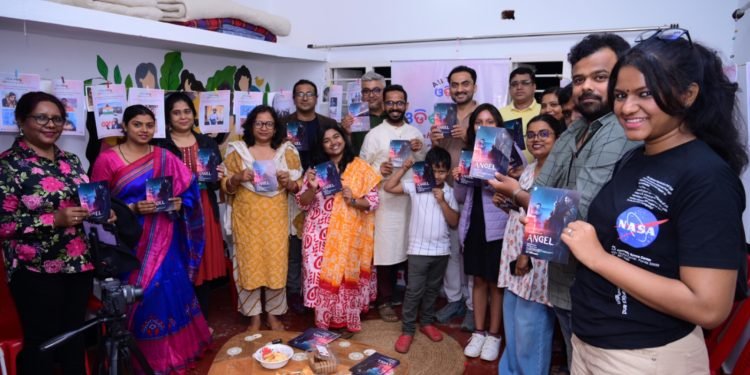Bhubaneswar: The sixth edition of Odisha Manaska, a community discourse and engagement platform by All Things Odisha, was held yesterday evening, at the head office of Safe Odisha For Her in Saheed Nagar. The event saw enthusiastic participation from around 30 individuals representing diverse fields, who deliberated on the theme, “Cultural Confidence or Identity Confusion: The Crisis of Odia Youth in a Migrant World.”
The discussion revolved around the challenges faced by Odia youth in preserving their cultural heritage amidst migration and globalization. The participants from all walks of life shared their lived experiences, insights, and oral narratives that highlighted the identity dilemmas of Odias across different strata of society.
The session was further enriched by the presence of the cast of the upcoming Odia film Angel, who unveiled the film’s poster and spoke about its unique cultural aspects.
A DEEP DIVE INTO CULTURAL IDENTITY:
During the discourse, participants explored the dilemmas of Odia youth, the erosion of cultural ties due to migration, and the pervasive identity confusion. They reflected on the root causes, such as the lack of inclusivity in Odia culture, the absence of Odia history and geography in the school curriculum, the rigidity of cultural practices, and the shortage of contemporary Odia icons.
The discussion also underscored the impact of migration on tribal youth and labor migrants, whose prolonged separation from their roots further deepens the crisis. Participants narrated their struggles with asserting their Odia identity in interactions outside Odisha and shared stories of rediscovery and pride in their heritage.
INSIGHTS FROM PROMINENT VOICES:
Actor Partha Sarathi Ray recounted his journey of reclaiming his Odia identity during his early career in Delhi and Mumbai. Similarly, actor-producer Swastik Choudhury shared his experiences of rediscovering Odia culture after moving to Chennai for work. Women’s rights activist Pranay Manjari Samal described her interactions with fellow Odia students at Azim Premji University, highlighting the prevalent identity dilemmas among the youth.
National award-winning filmmaker Sankhajeet Dey, who explained the socio-cultural impact of displacement and migration on individuals and communities. Rhea Resham Bari, tribal model, actor, and activist, who shed light on the struggles of tribal communities forced to migrate, often witnessing the gradual death of their traditions. Youngsters Abinash Bairiganjan and Saurabh Pahi, emphasized the need for relatable Odia icons and a unifying popular culture. Young filmmaker Siddarth Gautam, who lamented the declining use of the Odia language among children in private schools.
The participants agreed on the urgent need for fostering cultural pride, inclusivity, and resilience among Odias. They emphasized the importance of respecting Odisha’s cultural diversity rather than homogenizing its identity. Schools, they suggested, must integrate Odia history, language, and traditions into the curriculum beyond token observances. Participants also advocated about inclusivity as the cornerstone of Odia identity and suggested that evolution of cultural and social identity would stand the test of time.
Odisha Manaska once again succeeded in creating a space for open dialogue, storytelling, and collective reflection. The rich exchange of thoughts and ideas at the event served as a step toward honoring Odisha’s heritage while envisioning a future rooted in cultural confidence and inclusivity.
(EOM)






